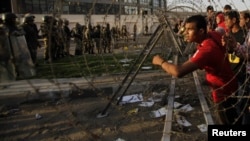CAIRO —
Egyptian authorities warned the Islamist Muslim Brotherhood on Saturday against staging violent protests and tightened security in all cities and strategic installations after clashes on Friday killed at least four people.
Supporters of deposed Islamist President Mohamed Morsi on Friday mounted their boldest demonstrations since troops crushed their protest camps demanding his reinstatement on Aug. 14.
Both opponents and supporters of the Brotherhood have called for mass protests on Sunday, when the country plans to celebrate the anniversary of an Egyptian attack on Israeli forces in the Sinai during the 1973 war.
“The Ministry of Interior asserts its determination on confronting violence and infringements of the law by Muslim Brotherhood supporters,” a ministry statement said.
“Security has been stepped up on highways, in all cities and at important installations. The Ministry of Interior warns against attempting to spoil the 6th of October commemoration.”
The military boosted its presence around Tahrir Square - where hundreds of thousands of Egyptians demonstrated during the revolt that toppled autocrat Hosni Mubarak in 2011 - after clashes on Friday in several cities.
Political tensions have gripped Egypt and hammered the economy since the army ousted Morsi in July, installed an interim government and presented a political roadmap it promised would bring fair elections.
In an apparent attempt to reassure Egyptians concerned by instability, Prime Minister Hazem el-Beblawi said in a statement to the nation on Saturday that “evil elements” still posed a danger but had lost much of their power, a reference to Islamist militants.
Beblawi said the political roadmap was “taking its natural course” and that he hoped it would conclude soon. He said the economy was starting to improve and “there were clear signs and reassuring indicators”.
Authorities have cracked down hard on the Brotherhood, which won every election since Mubarak's fall but became unpopular during Morsi's rule, with many Egyptians accusing him of trying to acquire sweeping powers and mismanaging the economy, allegations he denies.
The Brotherhood accuses the military of staging a coup and sabotaging Egypt's democracy by removing Morsi, the country's first freely-elected president.
On Aug. 14, Egypt's military-backed authorities smashed the two pro-Morsi sit-ins in Cairo, with hundreds of deaths, and then declared a state of emergency and imposed a curfew.
Many of the Brotherhood's leaders have been arrested since, raising fears that members of the movement might resort to violence against the state.
Attacks by Islamist militants in the Sinai, which borders Israel, have risen sharply since Morsi was toppled. Concerns are growing that an Islamist insurgency will take hold beyond the Sinai.
In September, a Sinai-based militant group claimed responsibility for a failed suicide bombing against the interior minister in Cairo.
Supporters of deposed Islamist President Mohamed Morsi on Friday mounted their boldest demonstrations since troops crushed their protest camps demanding his reinstatement on Aug. 14.
Both opponents and supporters of the Brotherhood have called for mass protests on Sunday, when the country plans to celebrate the anniversary of an Egyptian attack on Israeli forces in the Sinai during the 1973 war.
“The Ministry of Interior asserts its determination on confronting violence and infringements of the law by Muslim Brotherhood supporters,” a ministry statement said.
“Security has been stepped up on highways, in all cities and at important installations. The Ministry of Interior warns against attempting to spoil the 6th of October commemoration.”
The military boosted its presence around Tahrir Square - where hundreds of thousands of Egyptians demonstrated during the revolt that toppled autocrat Hosni Mubarak in 2011 - after clashes on Friday in several cities.
Political tensions have gripped Egypt and hammered the economy since the army ousted Morsi in July, installed an interim government and presented a political roadmap it promised would bring fair elections.
In an apparent attempt to reassure Egyptians concerned by instability, Prime Minister Hazem el-Beblawi said in a statement to the nation on Saturday that “evil elements” still posed a danger but had lost much of their power, a reference to Islamist militants.
Beblawi said the political roadmap was “taking its natural course” and that he hoped it would conclude soon. He said the economy was starting to improve and “there were clear signs and reassuring indicators”.
Authorities have cracked down hard on the Brotherhood, which won every election since Mubarak's fall but became unpopular during Morsi's rule, with many Egyptians accusing him of trying to acquire sweeping powers and mismanaging the economy, allegations he denies.
The Brotherhood accuses the military of staging a coup and sabotaging Egypt's democracy by removing Morsi, the country's first freely-elected president.
On Aug. 14, Egypt's military-backed authorities smashed the two pro-Morsi sit-ins in Cairo, with hundreds of deaths, and then declared a state of emergency and imposed a curfew.
Many of the Brotherhood's leaders have been arrested since, raising fears that members of the movement might resort to violence against the state.
Attacks by Islamist militants in the Sinai, which borders Israel, have risen sharply since Morsi was toppled. Concerns are growing that an Islamist insurgency will take hold beyond the Sinai.
In September, a Sinai-based militant group claimed responsibility for a failed suicide bombing against the interior minister in Cairo.








